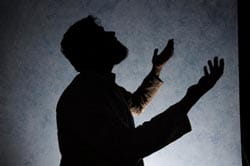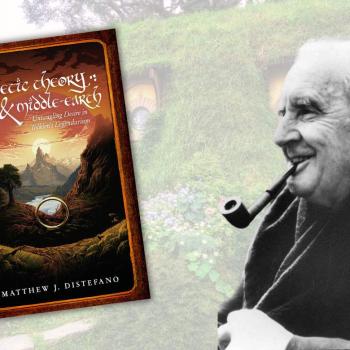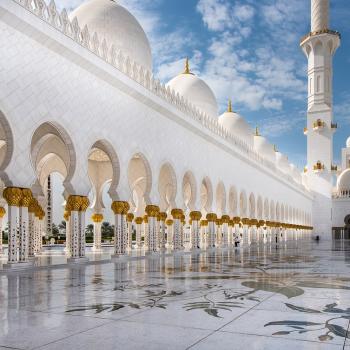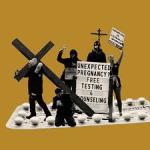By Abdul-Lateef Krauss
 Sometimes I think about how much my life has changed over the past three years. When I try to reflect back on my days before Islam, I often find it difficult to recapture what life was like. Sure, I can remember events, people, places, different experiences, but to go back and really feel what it was like, I have to reflect deeply. When I am able to re-connect with my "former self" I find it a remarkable experience. Although I am still very much the same person as I was then, how I experience the world and how I view it and life has completely changed. Life is the same, yet different.
Sometimes I think about how much my life has changed over the past three years. When I try to reflect back on my days before Islam, I often find it difficult to recapture what life was like. Sure, I can remember events, people, places, different experiences, but to go back and really feel what it was like, I have to reflect deeply. When I am able to re-connect with my "former self" I find it a remarkable experience. Although I am still very much the same person as I was then, how I experience the world and how I view it and life has completely changed. Life is the same, yet different.
We all view the world through a lens, whether we realize it or not. Our basic beliefs and values, whether derived from religion or some other source -- known or unknown -- allow us to judge the world, other people, and ourselves. It is how we understand right from wrong and impacts the intricate nuances of our daily lives.
As our world continues to move in strange and unpredictable ways, Muslims everywhere, particularly those living in the West, are finding themselves compelled to discuss Islam with non-Muslims of all backgrounds and beliefs. Many have existing biases against Islam while others come with an open mind. Either way, we who are Muslims must be capable and confident in not only being able to discuss basic Islamic beliefs, but in conveying our own experiences and feelings about the religion. Particularly for those of us who have converted to the faith, such occasions to discuss Islam with non-Muslims can be great opportunities to converse in a way that is personal and unique.
To be able to do this, however, requires knowledge of one's self and the knowledge of what one has undergone to arrive at his or her place within the religion of Islam. The power of personal stories and experiences is great, particularly those that an audience can relate to and actually see themselves taking part in. You can draw them in and help them to question their own beliefs -- an important step in opening up people's hearts and minds. Personal stories also help people empathize with what you have gone through, and such a level of understanding can be a powerful agent of change.
Understanding ourselves can be a great source of wisdom. Knowing who we are, our weaknesses, our faults, our strengths, and our "danger zones," is essential if we are to progress in our quest and ongoing effort of self-perfection in the mold of the Prophet of Islam (SAW). My process of converting from Christianity to Islam took intensive one-on-one study with a knowledgeable teacher and an additional wealth of independent study. The entire "process" occurred over one-and-a-half years, which may be long compared to some conversions, yet to others may be not so long. Nevertheless, throughout this period, every day, every moment in fact I was consumed with self-reflection. "Who was I?" and "Who did I want to be?" were two of the most nagging questions I had to answer; while probably the most prominent was, "What do I believe?"
Ultimately, the process of conversion for me began with this question of "What do I believe?" I was Christian, yet I did not really know what I believed about my own religion, the religion I was born into and practiced -- in varying degrees -- for 27 years. What I learned about myself through reflection, however, was that I did know what I believed, which was that I really didn't believe! Further questions I had were "What did I believe about God?" and "What did I believe about life?" and "How about death?" and "What did I believe about my society and culture?" All these questions seemed so big and so difficult to answer. But eventually I did answer them for myself, and -- Alhamdulillah (all praise be to God) -- the answers all pointed in the direction of Islam.
Although conversion is a phenomenon that is completely unique to everyone, nevertheless, those who are serious about it will all undoubtedly undergo self-examination of some kind in order to embrace a new way of life and belief system. In fact, we must do this. Whether we realize it or not, "conversion" occurs on many levels within us; and especially with those from the West, many, many engrained cultural values have to be challenged and overcome in order for "self-Islamization" to occur. In my time talking with born Muslim brothers, I have found it amazing that many dedicated Muslims have undergone their own rediscovery of the religion, almost in the same way as a non-Muslim who comes into Islam for the first time.
Many born Muslims I meet tell me that they have a certain level of envy for converts because they recognize a high level of dedication and appreciation for Islam within them that they too desire, but have been unable to achieve. In fact, in speaking with one brother from my local surau, he even had the courage to ask me what I thought was the cause of this. Of course I told him that I could only speak from my own experience, but that in my example much of it had to do with getting to know myself and facing up to my true beliefs about not only religion, but life itself. I empathize with Muslims who are born into Islam and cannot appreciate it as much as they would like. Perhaps they feel as I did about Christianity for many years.




